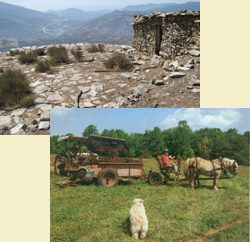« Food Production Systems in the Decline of the Industrial Age: A Call for a Socio-ecological Synthesis | Home | The Future of Industrial Society: “Progress”, A Microscopic Scientific Paradigm, and Blowback »
Three Farmhouses: A Study in Passive Solar Design
By Karl North | August 21, 2013
I have just added this account of my experiences in energy-efficient housing design and construction to my Core Papers on this website. It is an attempt to fill a gap in the literature of low energy design that, in view of the long-term energy crisis that the world is entering, I see as a serious deficiency. It was originally published by TCLocal, an energy descent research group in Ithaca, New York.
Current interest in “green design” tends to run to solar and wind electric technologies that replicate the push-button convenience that our society is used to but are very inefficient ways to heat a building. This approach bestows a certain social status but is so expensive that it is not a model likely to gain widespread adoption in an industrial economy now headed into long-term decline. Area developers sometimes promote “green materials” that may also confer status but rarely save as much of the planet as simple construction designs that dramatically reduce residential energy use.
Human consumption of planetary resources is now coming up against hard physical resource limits, with the following implications for home heating: 1) All fossil fuels will gradually become too scarce to be affordable for heating1; 2) As human society returns to reliance on biomass energy for many purposes, wood and other forms of biomass will become scarcer as well; 3) Unlike direct heat from the sun or biomass burning, other sources including “alternatives” like wind or solar electric heating require technologies that are expensive and energy conversions that waste energy, which makes them too costly for most people; 4) As fossil energy becomes more scarce, economies that currently can produce resource-intensive alternatives will no longer have the industrial capacity to provide these technologies at the necessary scale. The only answer is to use lower cost technologies.
Topics: Core Ideas, Recent Additions, Social Futures, Peak Oil, Relocalization | No Comments »
